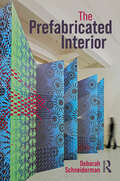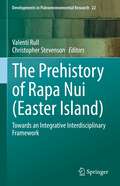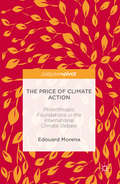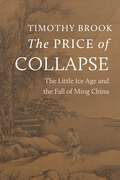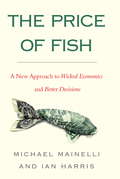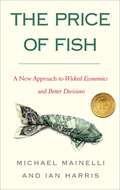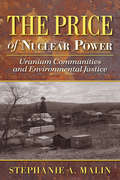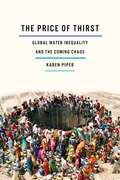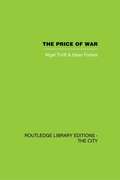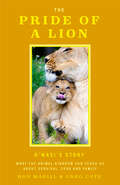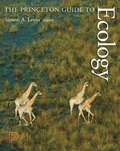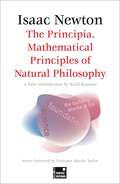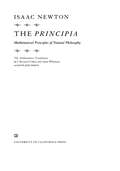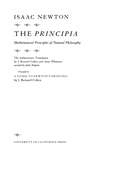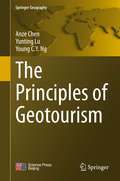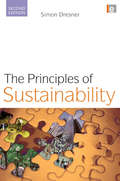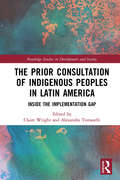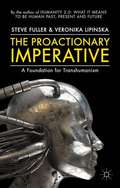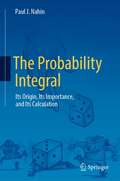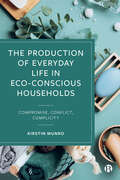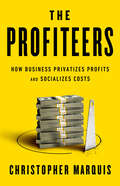- Table View
- List View
The Prefabricated Interior
by Deborah SchneidermanThough much attention has been given to the prefabrication of architecture, there has been little discussion on the influence and importance of prefabrication within the interior environment.This book does just that, providing a comprehensive investigation into the prefab interior from the 19th century to the present and beyond. Each chapter focuses on a typology of the prefabricated interior, looking at the bathroom, kitchen, workspace, furniture, mobile interiors, the prefab house, textiles, wearables, and the digital realm of printed interiors. Taken as a group, these chapters and illustrations indicate that constructs of the interior have been pivotal in the generation of techniques and processes of prefabrication in architecture and the built environment. Chapters explore a diverse range of examples of innovative prefabricated elements and assemblages within interior environments, illustrating the inherent sustainability, accessibility, building efficiency, and affordability of prefabricated design.The culmination of a decade of research by the leading expert on the topic, this will be the go-to resource on prefabricated interiors and an important read for all students and researchers in interior design.
The Prehistory of Rapa Nui: Towards an Integrative Interdisciplinary Framework (Developments in Paleoenvironmental Research #22)
by Christopher M. Stevenson Valentí RullThis book addresses the main enigmas of Easter Island’s (Rapa Nui, in the Polynesian language) prehistory from the time of initial settlement to European contact with a multidisciplinary perspective. The main topics include: (i) the time of first settlement and the origin of the first settlers; (ii) the main features of prehistoric Rapanui culture and their changes; (iii) the deforestation of the island and its timing and causes; (iv) the extinction of the indigenous biota, (v) the occurrence of climatic shifts and their potential effects on socioecological trends; (vi) the evidence for a cultural and demographic collapse before European contact; and (vii) the influence of Europeans on prehistoric Rapanui society. The book is subdivided into thematic sections and each chapter is written by renowned specialists in disciplines such as archaeology, anthropology, paleoecology, ethnography, linguistics, ethnobotany, phylogenetics/phylogeography and history. Contributors have been invited to provide an open and objective vision that includes as many views as possible on the topics considered. In this way, the readers may be able to compare different of points of view and make their own interpretations on each of the subjects considered. The book is intended for a wide audience including graduate students, advanced undergraduate students, university teachers and researchers interested in the subject. Given its multidisciplinary character and the topics included, the book is suitable for students and researchers from a wide range of disciplines and interests.
The Presidents and the Planet: Climate Change Science and Politics from Eisenhower to Bush
by Jay HakesThe Presidents and the Planet recounts the story of the world’s greatest environmental dilemma through the eyes of early climate change pioneers. It begins in the 1950s, when American scientists first warned about the risks of pollution altering the natural climate in dramatic ways, the national media began covering the matter, and experts first offered testimony to congressional committees on the topic. The story ends in the early 1990s, by which time global efforts to confront the challenge were advancing, while political turmoil had begun to undermine U.S. leadership’s ability to address current and future environmental threats.While some early proponents endorsing climate action are well known, many of the major players have gone largely unrecognized. The oceanographer Roger Revelle exerted influence on eight White Houses during his life and even one after his death, when his former student Al Gore assumed the office of vice president. William Nordhaus had already written seminal studies on climate change when President Jimmy Carter appointed him to the Council of Economic Advisors. Four decades later, the Yale professor won the Nobel Prize in economics for his work on the subject. John Chafee, a Republican from Rhode Island, chaired the Senate’s first committee on the problem and provided concrete solutions to face the dangers of a warming planet during the Reagan administration. The drama reached a full pitch during the George H. W. Bush years, as vocal advocates for climate action and staunch foes of government regulation wrestled over the direction of U.S. energy and environmental policy.To better trace the evolving climate debate in America, author Jay Hakes inspected the archives and writings of prominent scientists and the pivotal reports of the National Academy of Sciences, and traveled to presidential libraries to discover how commanders-in-chief and their science, economic, and political advisors addressed the issue. The Presidents and the Planet affords fresh perspectives that will alter the public’s understanding of when officials first grasped the dire consequences of climate change.
The Price of Climate Action
by Edouard MorenaThis book explores how a handful of liberal foundations contributed to establish and orientate the international climate regime. Looking back at the origins of international climate philanthropy and its evolution over the past three decades, the author examines the role of philanthropic foundations in the international climate debate. The research presented in this book shows that foundations, through their grant-making and convening activities, are at the heart of the climate debate. In fact, many credit them with having, through their activities prior to and at the COP, significantly contributed to laying the basis for the Paris Agreement in December 2015.
The Price of Collapse: The Little Ice Age and the Fall of Ming China
by Timothy BrookHow climate change ushered in the collapse of one of history&’s mighty empiresIn 1644, after close to three centuries of relative stability and prosperity, the Ming dynasty collapsed. Many historians attribute its demise to the Manchu invasion of China, but the truth is far more profound. The Price of Collapse provides an entirely new approach to the economic and social history of China, exploring how global climate crisis spelled the end of Ming rule.The mid-seventeenth century witnessed the deadliest phase of the Little Ice Age, when temperatures and rainfall plunged and world economies buckled. Timothy Brook draws on the history of grain prices to paint a gripping portrait of the final tumultuous years of a once-great dynasty. He explores how global trade networks that increasingly moved silver into China may have affected prices and describes the daily struggle to survive amid grain shortages and famine. By the early 1640s, as the subjects of the Ming found themselves caught in a deadly combination of cold and drought that defied all attempts to stave off disaster, the Ming price regime collapsed, and with it the Ming political regime.A masterful work of scholarship, The Price of Collapse reconstructs the experience of ordinary people under the immense pressure of unaffordable prices as their country slid from prosperity to calamity and shows how the market mediated the relationship between an empire and the climate that turned against it.
The Price of Fish
by Michael Mainelli Ian HarrisWinner of the 2012 Gold Medal IPPY Award for Finance/Investment/Economics. "Mainelli and Harris offer an original and insightful look at the big and important long-term issues facing society today. . . . Policy makers need to read this book."-Donald J. Smith, Boston University, author of BOND MATH: The Theory Behind the Formulas"In this thought-provoking and enlightening book, Mainelli and Harris highlight a point that economists too often forget: that economics is, at its heart, the study of human behavior, and that both commerce and its wicked sister, finance, mean nothing unless they are connected to people and society."-Bill Emmott, former editor of The Economist The price of fish cannot be right when we have over-fishing, hunger, and ruined seas. More than at any other time in our history, the world is faced with a series of vicious and apparently insurmountable difficulties, chief among them unstable financial markets, rapidly diminishing resources, and an ecosystem that is becoming dangerously volatile. In The Price of Fish, Michael Mainelli and Ian Harris examine in a unique way these intractable and wicked problems-sustainability, global warming, over-fishing, overpopulation, the pensions crisis-and suggest that it is not that these problems are too complex to solve, but that our way of reading them is too simple. Too simple and often wrong. Using models developed by quantum physicists, the authors show a way to making better decisions, which in turn, point to answers to our most pernicious problems. Now in paperback.Michael Mainelli and Ian Harris are co-founders of Z/Yen, a commercial think-tank in London, England.
The Price of Fish: A New Approach to Wicked Economics and Better Decisions
by Michael Mainelli Ian HarrisIn The Price of Fish, Michael Mainelli and Ian Harris examine in a unique way the world s most abiding and wicked problems sustainability, global warming, over-fishing, overpopulation, the pensions crisis; all of which are characterized by a set of messy, circular, aggressive and peculiarly long-term problems and go on to suggest that it is not the circumstances that are too complex, but our way of reading them that is too simple. Too simple and often wrong. The authors aim to blend four streams choice, economics, systems and evolution in a combination they believe is the key to making better decisions and, in turn, finding answers to the world's most pernicious problems.
The Price of Fish: A New Approach to Wicked Economics and Better Decisions
by Michael Mainelli Ian HarrisIn The Price of Fish, Michael Mainelli and Ian Harris examine in a unique way the world s most abiding and wicked problems sustainability, global warming, over-fishing, overpopulation, the pensions crisis; all of which are characterized by a set of messy, circular, aggressive and peculiarly long-term problems and go on to suggest that it is not the circumstances that are too complex, but our way of reading them that is too simple. Too simple and often wrong. The authors aim to blend four streams choice, economics, systems and evolution in a combination they believe is the key to making better decisions and, in turn, finding answers to the world's most pernicious problems.
The Price of Nuclear Power
by Stephanie A. MalinRising fossil fuel prices and concerns about greenhouse gas emissions are fostering a nuclear power renaissance and a revitalized uranium mining industry across the American West. In The Price of Nuclear Power, environmental sociologist Stephanie Malin offers an on-the-ground portrait of several uranium communities caught between the harmful legacy of previous mining booms and the potential promise of new economic development. Using this context, she examines how shifting notions of environmental justice inspire divergent views about nuclear power's sustainability and equally divisive forms of social activism. Drawing on extensive fieldwork conducted in rural isolated towns such as Monticello, Utah, and Nucla and Naturita, Colorado, as well as in upscale communities like Telluride, Colorado, and incorporating interviews with community leaders, environmental activists, radiation regulators, and mining executives, Malin uncovers a fundamental paradox of the nuclear renaissance: the communities most hurt by uranium's legacy--such as high rates of cancers, respiratory ailments, and reproductive disorders--were actually quick to support industry renewal. She shows that many impoverished communities support mining not only because of the employment opportunities, but also out of a personal identification with uranium, a sense of patriotism, and new notions of environmentalism. But other communities, such as Telluride, have become sites of resistance, skeptical of industry and government promises of safe mining, fearing that regulatory enforcement won't be strong enough. Indeed, Malin shows that the nuclear renaissance has exacerbated social divisions across the Colorado Plateau, threatening social cohesion. Malin further illustrates ways in which renewed uranium production is not a socially sustainable form of energy development for rural communities, as it is utterly dependent on unstable global markets. The Price of Nuclear Power is an insightful portrait of the local impact of the nuclear renaissance and the social and environmental tensions inherent in the rebirth of uranium mining.
The Price of Thirst: Global Water Inequality and the Coming Chaos
by Karen Piper&“There's Money in Thirst,&” reads a headline in the New York Times. The CEO of Nestlé, purveyor of bottled water, heartily agrees. It is important to give water a market value, he says in a promotional video, so &“we're all aware that it has a price.&” But for those who have no access to clean water, a fifth of the world's population, the price is thirst. This is the frightening landscape that Karen Piper conducts us through in The Price of Thirst—one where thirst is political, drought is a business opportunity, and more and more of our most necessary natural resource is controlled by multinational corporations. In visits to the hot spots of water scarcity and the hotshots in water finance, Piper shows us what happens when global businesses with mafia-like powers buy up the water supply and turn off the taps of people who cannot pay: border disputes between Iraq and Turkey, a &“revolution of the thirsty&” in Egypt, street fights in Greece, an apartheid of water rights in South Africa. The Price of Thirst takes us to Chile, the first nation to privatize 100 percent of its water supplies, creating a crushing monopoly instead of a thriving free market in water; to New Delhi, where the sacred waters of the Ganges are being diverted to a private water treatment plant, fomenting unrest; and to Iraq, where the U.S.-mandated privatization of water resources destroyed by our military is further destabilizing the volatile region. And in our own backyard, where these same corporations are quietly buying up water supplies, Piper reveals how &“water banking&” is drying up California farms in favor of urban sprawl and private towns.The product of seven years of investigation across six continents and a dozen countries, and scores of interviews with CEOs, activists, environmentalists, and climate change specialists, The Price of Thirst paints a harrowing picture of a world out of balance, with the distance between the haves and have-nots of water inexorably widening and the coming crisis moving ever closer.
The Price of War: Urbanization in Vietnam, 1954-1985
by Nigel Thrift Dean ForbesMuch rare material is incorporated in this unique account of urbanization in a developing country that was ravaged by war for twenty years. With due emphasis on the experience of Hanoi and Ho Chi Minh City (Saigon), the authors present an account of what happened to the towns and cities of Vietnam between the establishment of Ho Chi Minh's socialist state in 1954 and the mid 1980s. The story is introduced through a general theoretical and empirical account of urbanization in socialist Third World countries. The book stresses the importance of the turmoil created by warfare in directing urbanization, but it also refers to the more conventially studied determinants of the process such as the institution of a planned economy. As one of the few books highlighting the impact of warfare on urban settlements, The Price of War will interest all those interested in urbanization, development and South-East Asia. This book was first published in 1986.
The Pride of a Lion: What the Animal Kingdom Can Teach Us About Survival, Fear and Family
by Greg Cote Ron MagillThe Indomitable Spirit of K’wasi the Lion Cub May Forever Change Your Perspective on Life“To millions of people in Miami and beyond, Ron Magill is the face and voice of all things’ wildlife.” ─Mireya Mayor, PhD and National Geographic ExplorerEditors' Pick#1 Best Seller in Biology of Cats, Lions & TigersDiscover the true and incredible survival story of K’wasi, the lion cub who overcame unimaginable odds Magnificently documented by wildlife expert Ron Magill. K’wasi’s story is told by world renowned wildlife photographer and Zoo Miami’s “Goodwill Ambassador”, Ron Magill who documented and photographed every stage of K’wasi’s remarkable roller coaster life. Join Ron and his half-a-century career as he helps us all understand the life lessons the animal kingdom has for us.A survival story of grit and resilience. The story of K’wasi the lion cub is one of heartbreak and triumph. He was born to Asha at Zoo Miami in late 2013 and captured the heart of the nation as an incredibly cute lion cub. K’wasi was orphaned in March 2014 when his mother tragically died. K’wasi’s remarkable journey takes him from the untimely death of his mother to magnificent star of Lion Country Safari.Animals have feelings too. Society has only recently accepted the incredible emotional intelligence of dogs, pigs, and chimpanzees. But through K’wasi’s remarkable story, Ron Magill details how evolved the animal kingdom truly is—lions in particular. Funny, engaging, touching, and thrilling, The Pride of a Lion teaches us about family, resilience, and the meaning of life.Inside find:Gripping accounts of K'wasi's triumphs against extreme adversityRon Magill's stunning wildlife photography capturing K'wasi's remarkable lifeProfound insights into the emotional intelligence and complex social dynamics of the lion kingdomA fan of The Lion King, or liked The Lion Tracker’s Guide to Life, The Soul of an Octopus, or The Good Good Pig? Then you'll love The Pride of a Lion.
The Primacy of Doubt: From Quantum Physics to Climate Change, How the Science of Uncertainty Can Help Us Understand Our Chaotic World
by Tim Palmer&“Quite possibly the best popular science book I&’ve ever read&” (Popular Science) shows how the tools that enabled us to overcome the uncertainty of the weather will enable us to find new answers to modern science's most pressing questions Why does your weather app say &“There&’s a 10% chance of rain&” instead of &“It will be sunny tomorrow&”? In large part this is due to the insight of Tim Palmer, who made uncertainty essential to the study of weather and climate. Now he wants to apply it to how we study everything else. In The Primacy of Doubt, Palmer argues that embracing the mathematics of uncertainty is vital to understanding ourselves and the universe around us. Whether we want to predict climate change or market crashes, understand how the brain is able to outpace supercomputers, or find a theory that links quantum and cosmological physics, Palmer shows how his vision of mathematical uncertainty provides new insights into some of the deepest problems in science. The result is a revolution—one that shows that power begins by embracing what we don&’t know.
The Princeton Guide to Ecology
by Simon A. LevinThe Princeton Guide to Ecology is a concise, authoritative one-volume reference to the field's major subjects and key concepts. Edited by eminent ecologist Simon Levin, with contributions from an international team of leading ecologists, the book contains more than ninety clear, accurate, and up-to-date articles on the most important topics within seven major areas: autecology, population ecology, communities and ecosystems, landscapes and the biosphere, conservation biology, ecosystem services, and biosphere management. Complete with more than 200 illustrations (including sixteen pages in color), a glossary of key terms, a chronology of milestones in the field, suggestions for further reading on each topic, and an index, this is an essential volume for undergraduate and graduate students, research ecologists, scientists in related fields, policymakers, and anyone else with a serious interest in ecology. Explains key topics in one concise and authoritative volume Features more than ninety articles written by an international team of leading ecologists Contains more than 200 illustrations, including sixteen pages in color Includes glossary, chronology, suggestions for further reading, and index Covers autecology, population ecology, communities and ecosystems, landscapes and the biosphere, conservation biology, ecosystem services, and biosphere management
The Principia. Mathematical Principles of Natural Philosophy (Foundations)
by Sir Isaac Newton Professor Marika TaylorNewton's bold masterwork helped shaped the cultural landscape of the world today. Now in a digestible, pocket format for the modern reader.New concise edition with a new introduction, abridged for the modern reader. The Principia. Mathematical Principles of Natural Philosophy is one of the most important scientific works ever to have been written and has had a profound impact on modern science. Consisting of three separate books, the Principia states Newton&’s laws of motion and Newton&’s law of universal gravitation. Understanding and acceptance of these theories was not immediate, however by the end of the seventeenth century no one could deny that Newton had far exceeded all previous works and revolutionised scientific thinking.The FLAME TREE Foundations series features core publications which together have shaped the cultural landscape of the modern world, with cutting-edge research distilled into pocket guides designed to be both accessible and informative.
The Principia: The Authoritative Translation
by Sir Isaac NewtonIn his monumental 1687 work, Philosophiae Naturalis Principia Mathematica, known familiarly as the Principia, Isaac Newton laid out in mathematical terms the principles of time, force, and motion that have guided the development of modern physical science. Even after more than three centuries and the revolutions of Einsteinian relativity and quantum mechanics, Newtonian physics continues to account for many of the phenomena of the observed world, and Newtonian celestial dynamics is used to determine the orbits of our space vehicles. This authoritative, modern translation by I. Bernard Cohen and Anne Whitman, the first in more than 285 years, is based on the 1726 edition, the final revised version approved by Newton; it includes extracts from the earlier editions, corrects errors found in earlier versions, and replaces archaic English with contemporary prose and up-to-date mathematical forms. Newton's principles describe acceleration, deceleration, and inertial movement; fluid dynamics; and the motions of the earth, moon, planets, and comets. A great work in itself, the Principia also revolutionized the methods of scientific investigation. It set forth the fundamental three laws of motion and the law of universal gravity, the physical principles that account for the Copernican system of the world as emended by Kepler, thus effectively ending controversy concerning the Copernican planetary system. The translation-only edition of this preeminent work is truly accessible for today's scientists, scholars, and students.
The Principia: The Authoritative Translation and Guide
by Sir Isaac NewtonIn his monumental 1687 work, Philosophiae Naturalis Principia Mathematica, known familiarly as the Principia, Isaac Newton laid out in mathematical terms the principles of time, force, and motion that have guided the development of modern physical science. Even after more than three centuries and the revolutions of Einsteinian relativity and quantum mechanics, Newtonian physics continues to account for many of the phenomena of the observed world, and Newtonian celestial dynamics is used to determine the orbits of our space vehicles. This authoritative, modern translation by Cohen and Whitman, the first in over 285 years, is based on the 1726 edition, the final revised version approved by Newton; it includes extracts from the earlier editions, corrects errors found in earlier versions, and replaces archaic English with contemporary prose and up-to-date mathematical forms. Newton's principles describe acceleration, deceleration, and inertial movement; fluid dynamics; and the motions of the earth, moon, planets, and comets. A great work in itself, the Principia also revolutionized the methods of scientific investigation. It set forth the fundamental three laws of motion and the law of universal gravity, the physical principles that account for the Copernican system of the world as emended by Kepler, thus effectively ending controversy concerning the Copernican planetary system. The illuminating Guide to the Principia by I. Bernard Cohen, along with his and Anne Whitman's translation, make this preeminent work truly accessible for today's scientists, scholars, and students.
The Principles of Geotourism
by Anze Chen Yunting Lu Young C. Y. NgThe book introduces tourism earth-science as a new scientific discipline by applying the principles of earth-science in the study of natural and human tourism resources. It involves studying the geo-scientific characteristics of these tourism resources through surveys, evaluation and aesthetic value assessment. It also discusses about the principles behind geopark establishment and management. It is an important publication providing direction for geopark and tourism developments in China. The book is a tool for geological heritage survey, assessment and research. It can also be used to assist planning of geopark, national parks, heritage protection and scientific interpretation. It is a valuable teaching material for teachers and students of geoscience and tourism as well as providing useful guidance for geopark managers and tour guides in their operation. In addition, the book also offers scientific knowledge of the surrounding natural and cultural landscapes to the public and the general visitors.
The Principles of Sustainability
by Simon DresnerAt a time of increasingly rapid environmental deterioration and climate change, sustainability is one of the most important issues facing the world. Can we create a sustainable society? What would that mean? How should we set about doing it? How can we bring about such a profound change in the way things are organized? This text tackles these questions directly. It covers: historical development of the concept of sustainability; contemporary debates about how to achieve it; and obstacles and the prospects for overcoming them. This new fully revised edition covers the latest on the climate change front, particularly the advances in scientific understanding and political awareness of climate change. Other updates include more recent economic analyses, particularly the Stern Report, and the global shift away from faith in markets over the past five years.
The Prior Consultation of Indigenous Peoples in Latin America: Inside the Implementation Gap (Routledge Studies in Development and Society)
by Claire Wright Alexandra TomaselliThis book delves into the reasons behind and the consequences of the implementation gap regarding the right to prior consultation and the Free, Prior and Informed Consent (FPIC) of Indigenous Peoples in Latin America. In recent years, the economic and political projects of Latin American States have become increasingly dependent on the extractive industries. This has resulted in conflicts when governments and international firms have made considerable investments in those lands that have been traditionally inhabited and used by Indigenous Peoples, who seek to defend their rights against exploitative practices. After decades of intense mobilisation, important gains have been made at international level regarding the opportunity for Indigenous Peoples to have a say on these matters. Notwithstanding this, the right to prior consultation and the FPIC of Indigenous Peoples on the ground are far from being fully applied and guaranteed. And, even when prior consultation processes are carried out, the outcomes remain uncertain. This volume rigorously investigates the causes of this implementation gap and its consequences for the protection of Indigenous Peoples’ rights, lands, identities and ways of life in the Latin American region.
The Private Rental Sector in Australia: Living with Uncertainty
by Alan Morris Hal Pawson Kath HulseThis book explores the decline and growth of the private rental sector in Australia delving into the changing dynamics of landlord investment and tenant profile over the course of the twentieth century and into the present period. It explains why over one in four Australian households are now private renters and investigates the contemporary legal and regulatory frameworks governing the sector. The reform discourses in Australia and comparator countries, and debates around key concerns such as Australia’s advantageous tax treatment of investors in rental property and the power imbalance between tenants and landlords are highlighted. The book draws on rich data: 600 surveys and close to 100 in-depth interviews with tenants in high, medium and low rent areas in Sydney and Melbourne and regional New South Wales. The book provides in-depth insights into this large and expanding component of Australia’s housing market and shows how being a private renter shapes the everyday lives and wellbeing of people and households who rent their housing including short and long-term renters, those on low and higher incomes and older as well as younger people.
The Proactionary Imperative
by Steve FullerThe Proactionary Imperative debates the concept of transforming human nature, including such thorny topics as humanity's privilege as a species, our capacity to 'play God', the idea that we might treat our genes as a capital investment, eugenics and what it might mean to be 'human' in the context of risky scientific and technological interventions.
The Probability Integral: Its Origin, Its Importance, and Its Calculation
by Paul J. NahinThis book tells the story of the probability integral, the approaches to analyzing it throughout history, and the many areas of science where it arises. The so-called probability integral, the integral over the real line of a Gaussian function, occurs ubiquitously in mathematics, physics, engineering and probability theory. Stubbornly resistant to the undergraduate toolkit for handling integrals, calculating its value and investigating its properties occupied such mathematical luminaries as De Moivre, Laplace, Poisson, and Liouville. This book introduces the probability integral, puts it into a historical context, and describes the different approaches throughout history to evaluate and analyze it. The author also takes entertaining diversions into areas of math, science, and engineering where the probability integral arises: as well as being indispensable to probability theory and statistics, it also shows up naturally in thermodynamics and signal processing. Designed to be accessible to anyone at the undergraduate level and above, this book will appeal to anyone interested in integration techniques, as well as historians of math, science, and statistics.
The Production of Everyday Life in Eco-Conscious Households: Compromise, Conflict, Complicity
by Kirstin MunroBased on qualitative interviews with sustainability-oriented parents of young children, this book describes what happens when people make interventions into mundane and easy-to-overlook aspects of everyday life to bring the way they get things done into alignment with their environmental values. Because the ability to make changes is constrained by their culture and capitalist society, there are negative consequences and trade-offs involved in these household-level sustainability practices. The households described in this book shed light on the full extent of the trade-offs involved in promoting sustainability at the household level as a solution to environmental problems.
The Profiteers: How Business Privatizes Profits and Socializes Costs
by Christopher MarquisAn exposé of how society pays for corporations' "free lunch" and the cost of environmental damage, low wages, systemic discrimination, and cheap goods. In an age when business leaders solemnly profess dedication to principles of environmental and social justice, Christopher Marquis&’s provocative investigation into the real costs of doing business reveals the way that leaders of the corporate world gaslight to evade responsibilities by privatizing profits and socializing costs. &“Who pays?&” for the resulting climate and environmental damage, racism, low wages, and cheap goods: the average citizen and the taxpayer. By bringing to light ideas that today are on the fringe but rapidly making their way into the mainstream, Marquis outlines a new regenerative paradigm for business in society. He tells of a group of pioneers trying to not just reform but transform the way business is conducted all over the world. By taking novel actions to reimagine business operations in responsible ways, minimize their negative impacts, and create new ways for business to properly absorb their hidden costs, these leaders provide blueprints to move the needle on vexing social and environmental issues. What&’s in it for leaders of the corporate world? The model of reform presented provides clear guidance on how to get ahead of the curve as an emerging economic order is formed. No business can lead from the front if it is morally-backward looking. History has shown time and again that those who get out in front of emerging changes in our social and environmental landscape protect themselves from inevitable eclipse.
